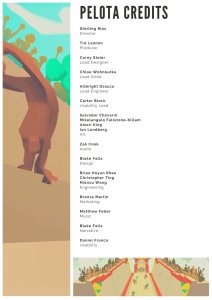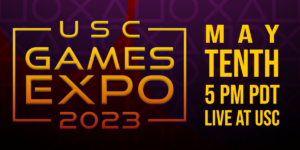
Sterling Rios’s game Pelota headlines this year’s Game Expo. Photo courtesy of Sterling Rios
Sterling Rios started programming games when he was 8. The first game he built when he was about 9 or 10 – he can’t remember – was “Wizard Duel,” which is exactly what it sounds like.
But Rios, who graduates this May with a degree in computer science and games, found his voice as a game developer at the USC Viterbi School of Engineering by digging into his LatinX roots and designing a game that pushes the bounds of interactivity and physics.
His game, “Pelota,” part of the USC Advanced Games Program, headlines May 15 at the USC Games Expo – the annual showcase of the best in games from USC Games — a collaboration between the USC School of Cinematic Arts’ Interactive Media & Games Division and the USC Viterbi’s Department of Computer Science — the top-ranked program in North America, per Princeton Review.
A love letter to his heritage
“Pelota” is an action-packed, online multiplayer game that brings an ancient sport into a new level of interactivity. Players are immersed in a vibrant Mesoamerican setting as they master the game’s novel physics-based mechanics to get the game ball through a vertical hoop, using everything they have—except their hands—in order to win the favor of the gods.
Personally, for Rios, Pelota is also a love letter to his Latino heritage.
“I was raised by a village,” said Rios, who grew up in San Antonio. “My father’s family comes from Múzquiz, a municipality within the state of Coahuila in northeastern Mexico. My abuelo and abuela came to America in 1955. My mother is actually German-American. Her family has been here since the early 1900s. Both sides settled down in Texas.”
Rios sees Pelota as a way to give back to the multicultural “village” that made him who is today. The other inspiration was less sentimental and more technical.
“I had never made an online, multiplayer game before,” said Rios, who apart from being the game’s director, was one of five engineers on the 20-person team. “I wanted to push myself and find out what it’s like to work a full cycle with a development team in an industry-emulated way.”
Rios credits “Pelota’s” success to his team’s dedication, pushing through the challenges of developing a complex game during the pandemic. A prime example is the engineering team’s physics engine and peer-to-peer networking solution responsible for the game’s fast, responsive gameplay and consistent physics.
The engineering is comparable to Psyonix’s hit game “Rocket League” in which players use rocket-powered cars to play soccer. That game typically employs dozens of engineers from around the world. “Pelota” had to build comparable solutions but using only four engineers in less than one year.
“Mapping out a full-contact sport that allows for a lot of expressions is a huge design challenge,” Rios said. “Add to that remote communication during Covid-19. We had to think in systems, but we also had to maintain a healthy team vibe, to be able to relate to one another and support each other because at the end of the day we’re all new at this.”
Uniting the ancient with the new
 The Mesoamerican ballgame was played by teams of up to four people with a solid rubber ball weighing about 10 pounds. Sometimes, a team’s loss meant death. The Maya used the game as a stand‐in for warfare, to settle territories or predict the future. It had dramatic, divine stakes and Rios didn’t want those nuances lost on the players.
The Mesoamerican ballgame was played by teams of up to four people with a solid rubber ball weighing about 10 pounds. Sometimes, a team’s loss meant death. The Maya used the game as a stand‐in for warfare, to settle territories or predict the future. It had dramatic, divine stakes and Rios didn’t want those nuances lost on the players.
His team spent months looking at ancient ball courts from the Americas, immersing themselves in the myths, practices, and symbols that governed the ancient Mesoamerican world.
It all informed the aesthetics and the mechanics of the game that are built on kinetic energy, physicality, and fun. Although the game is meant to be played using controllers, Rios wanted to create a sense of physical embodiment over the game’s characters and a sense of teamwork and camaraderie that create a spectacular experience.
They designed the controls as analog and physical as possible while still maintaining playability. Take the way players shoot or pass the ball in-game, for example. They flick a joystick in the direction of the shot or pass, rather than just hit a button.
“It’s this big divine contest between two teams,” Rios said. “It’s really about throwing your whole body into the game because that’s the way that the Mesoamerican ballgame was played,” Rios said.
After graduation, Rios plans to continue refining “Pelota” even as he interviews with several prominent game companies. He looks back fondly at his time as an engineering student, especially teaching virtual reality, C#, and Unity to high school students at summer camps.
“I appreciate the way teaching allows me to solidify my own knowledge, while simultaneously giving back to others,” he said.
Published on May 12th, 2021
Last updated on May 12th, 2021












